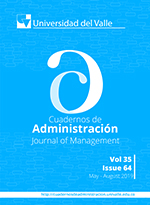Individual unlearning from the point of view of managers in merger and acquisition events in Brazil
Keywords:
Individual unlearning, Managerial unlearning, Managerial learning, Mergers and acquisitionsMain Article Content
Unlearning goes on to constitute a mechanism that facilitates the acquisition of new learning, and as such, represents a way for dealing with personal resistance in relation to processes of organizational change. In spite of the importance of the theme, it is argued that there exists little empirical understanding on the form through which unlearning operates, which collaborates toward the approach of the theme, in organizational research studies, being conceptually confusing. In this way, this research analyzes that which represents unlearning and its relationship with learning, from the perspective of managers that have experienced an unlearning situation from the events of mergers and acquisitions. The study method is based on a narrative analysis that is focused on reports from 20 managers from middle and top level of large sized Brazilian companies, all of which experienced a merger and acquisition event. The results show that a majority of managers have been through some kind of unlearning, which represented the way by which the practice of old learnings was interrupted, through the proposal of adaptation to the new work context. In addition, unlearning was noted not to necessarily represent the forgetting of prior learnings, which may themselves be maintained in the repertoire of individual knowledge. For some managers, however, unlearning can lead to the modification of previous understandings on a particular subject. Finally, the results show that unlearning may occur, without the need for the occurrence of any new learning. The study contributes toward the deeper understanding of the nature surrounding this phenomenon and associated types, thus producing implications to research on the theme concerning management learning.

